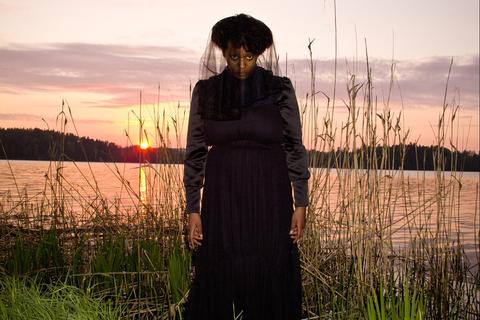Mirel Wagner
The great Townes Van Zandt once said there are two kinds of music: "The blues and zip-a-dee-doo-dah."
According to this, Mirel Wagner's self-titled debut falls solidly into the blues category. "Songwriting can hardly be more minimalistic, no-frills, more strict as Mirel Wagner's sparse music," according to German magazine Spex; we agree.
Mirel Wagner was born in Ethiopia, and grew up in peaceful conditions in Espoo, the second-largest city in Finland. At age 7 she was given violin lessons, at 13 she switched to guitar and at 16 she wrote her first songs ("To The Bone", the opening song from her album, is one of those early tunes).
Jean Ramsay, an American music journalist living in Finland, came across Mirel at an open mic session in Helsinki. He was particularly convinced of her talent, raved about her in an early article and recommended her to others. So, without producing a demo or contacting any record labels, Mirel found herself sitting in a real recording studio. Over two days she recorded 12 songs straight. Nine of them can be found on her debut, which was first released in Finland through the indie label Kioski Recs and mainland Europe through Bone Voyage, and is now seeing a wider release across North America through Friendly Fire Recordings. Whether in Finland, France or Germany, journalists who have listened closely are full of praise for this unique young talent who has appeared, seemingly out of the blue, with her otherworldly gloomy folk.
This debut is quiet and intimate. It's a minimalist record, in the best sense: stoicly picked, almost trance-inducing acoustic guitar, a voice you wouldn't expect to hear from a 23 year old, and songs that mostly avoid classical folk song structure (they're "lonely prayers in expressionistic language", writes another German critic). Everything is stripped to the bone and maintains a beautiful, strangely fragile tension, even more so during Mirel's live performances. "The singer is majestic in her sobriety," a French critic has written of Mirel. "She will literally knock you down with her candor and tenderness, captivating with her melodic charisma, wonderful and quiet... It's music from another time, fabulous and elusive."
As the ghostly mood floats through her album, Mirel's lyrics deal with equally dark themes: necromancy, love, death and the devil. These are not happy songs. But Mirel avoids any overly theatric gestures and instead imbues her songs with a subtle lyrical grace, even when the songs are about dead lovers and equally dark topics. In this sense, Mirel draws from a deep tradition of moody, introspective songwriters that includes such luminaries as Leonard Cohen and Nick Drake.
All of which begs the question: how can a young woman sound so sad? In an interview with the German Rolling Stone, Mirel said: "I think it's a bit lazy to say that I make sad music. Of course you might say the lyrics are bizarre or dark. But for me, the songs are first and foremost filled with desire. And there's this hope in them that love overcomes everything. What I find sad is the soulless music that is on the radio most of the time, music that is simply product. If there is no life in it... is this not much sadder than a melancholic song?"
***
"Really beautiful recordings and songs." (Steve Shelley / Sonic Youth on Vampire Blues)
"It was like the world stood completely still for 3 minutes and 10 seconds when I heard this song and saw this video for the first time. So beautiful, so fragile and yet so strong. There's some kind of dark, lullaby-like atmosphere in this music, with a simple arrangement that works perfectly. Everything seems to be stripped down to its core. Hauntingly beautiful." (Eardrums Music on the video for "No Death")
"In her words and her sound you can see a landscape lit by moonlight, fog swirling about like ghosts dancing a slow waltz, stately old trees hanging heavy with Spanish moss. You sense an eerie otherworldliness in the atmosphere she weaves, and you can't tear your ears away from that voice and that melody. She has created something that you rarely or never hear these days. On the banks of the Mississippi Delta in the 1920s it might have been common. But the thing is, Mirel Wagner is here now, in the second decade of the 2000s, and she's from Finland." (Spydersden)
"Mirel Wagner is the real deal, an innovator among imitators. In a genre ridden with cliches she cuts through with the sheer power of her lyrics and intricately fingerpicked guitar. And that voice! It is the antithesis of how a young woman in her early twenties should sound. It has those world-weary and resigned tones that make Billie Holiday and Leonard Cohen so appealing. It sounds like the truth." (Jean Ramsay/Rumba)



